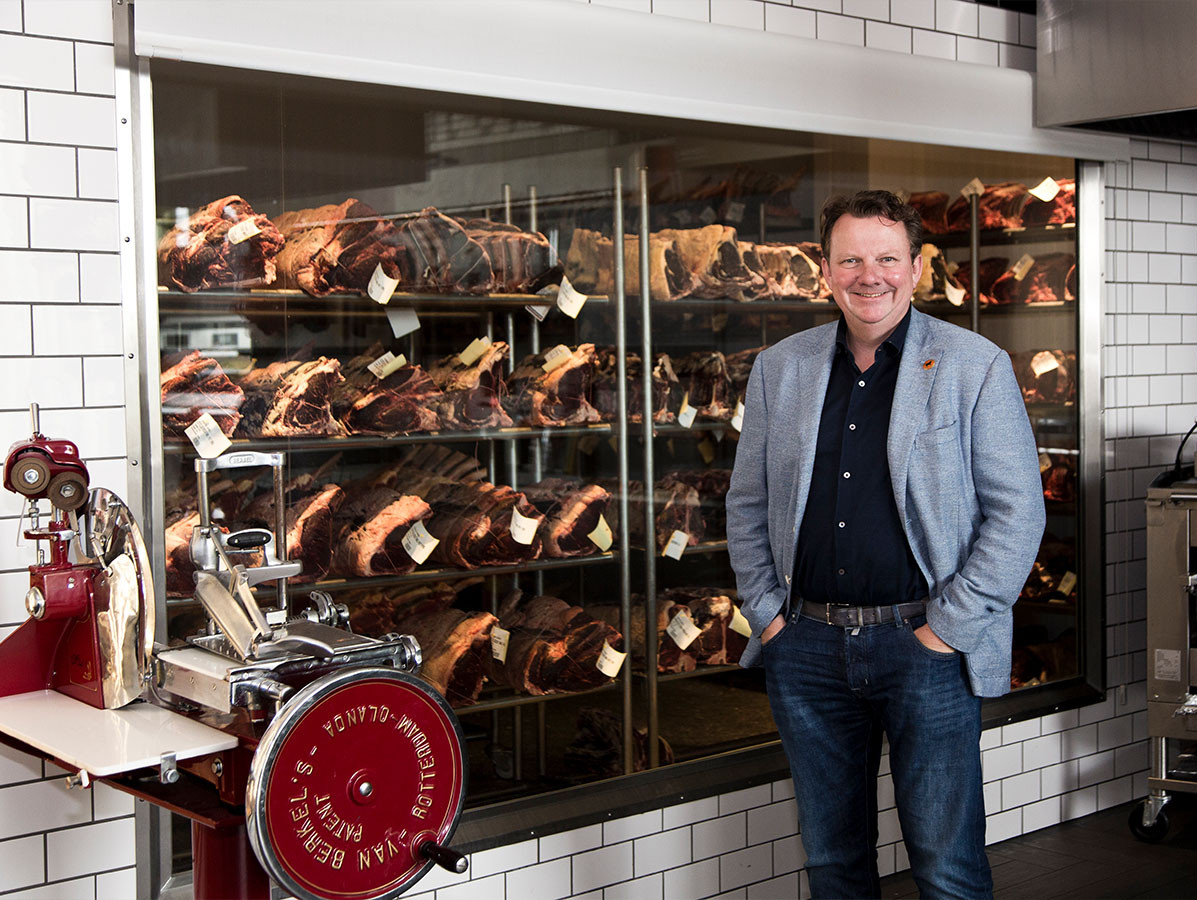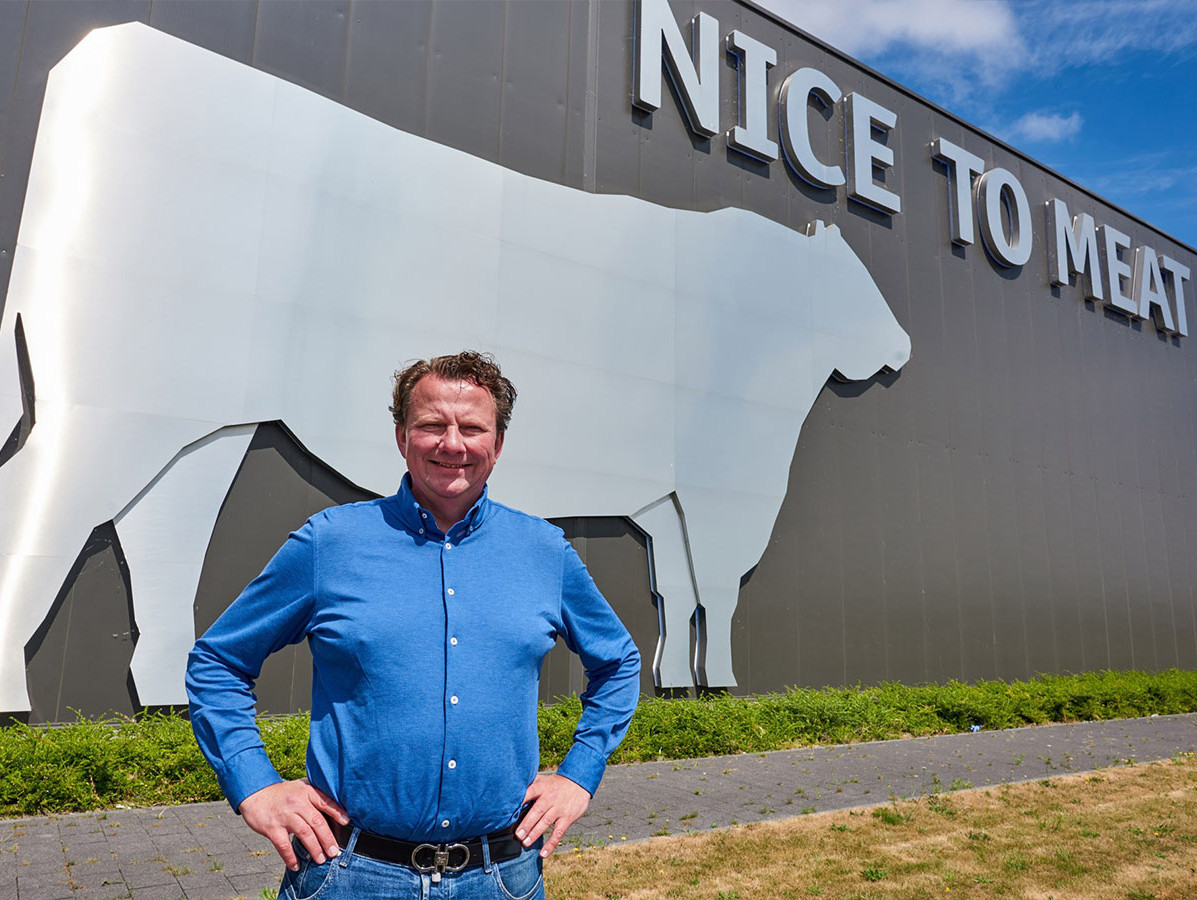
Nice to Meat has been supplying meat to the catering industry for 128 years. In the 1990s, Mikel Pouw took over the company. With success. Mainly thanks to his conclusion that little top-quality meat was being sold in the Netherlands. He seized this opportunity, and has been importing the most extraordinary types of meat from all over the world since 1997.
Taking over Nice to Meat was a great opportunity for Mikel Pouw to turn a small, urban catering butcher into a regional player. "When I took over, we quickly asked ourselves this question: how do we keep our heads above water in a mature market? Most companies in our segment also supplied to hospitals and prisons. We felt a focus on the hospitality industry was a way to differentiate ourselves. That decision didn't hurt us. We are now one of the largest catering butchers in the Netherlands."
"Delivering consistent quality. Meat is a natural product and anything can happen to it. Pre-selection is therefore very important. We have three labels for quality: Nice to Meat Classic, Select and the Gold range. To ensure that Gold meat really is of the highest quality, we buy it as close to its origin as possible, preferably from the farmer himself. That way, we maintain control over quality. The majority of the meat in this category is purchased abroad. Our affiliate organisation that takes care of this, Nice to Meat International, is run by my brother Patrick Pouw. For example, he buys Creekstone Black Angus in the US, and we were the first to introduce Wagyu to the European market. We also have a number of Maas, Rijn and IJssel cattle ourselves, which we breed and slaughter via our top butcher Piet van den Berg."
"That certainly wasn't easy. I supplied Hotel Okura, the only Japanese hotel chain operating internationally at the time. One of the hotel's restaurants had a Michelin star. They were keen to offer Wagyu to their guests. Mr Oshima, the executive chef of Yamazato and Sazanka restaurant, taught me the Japanese way. In Japan, there's really only one way: perfect. Every Friday afternoon I had to deliver twenty tenderloins. For three years, I always got back four to six. I had to get new ones that same afternoon. There is no butcher that accepts that, but I saw it as an opportunity to learn. Nice to Meat started applying those strict quality requirements throughout its entire business."
"In the beginning, there was a lot of scepticism among my colleagues. The meat was way more expensive, it was fatty and there wasn't a lot of it being produced. Butchers therefore thought we were wasting our time. I saw it differently, because we had the very best meat in the world in our hands. That ultimately means the customer trusts your other products too. When we started offering Wagyu, I got in touch with the best chefs in the Netherlands. That gave us an advantage. They often know very well what products are in demand, so they are always willing to help you to find something new. If a product like Wagyu catches on, you're only briefly the sole importer."
"Our catering butchery celebrated its 125th anniversary in 2019. We believe that as a butcher, we can still exist for 125 years, but you have to move forward as time goes on. A webshop is the future of selling meat to consumers. The pandemic provided a huge boost to our newly launched webshop. The step proved crucial as it got us through the corona period. Since the pandemic, our business has been on a rollercoaster. Before that, we had 120 employees. During the pandemic, we scaled down to almost half our workforce. Our sales were down 90% in a fortnight. The positive thing is that shipping meat became a lot more popular. In addition, people were looking for an alternative to catering, so our webshop grew significantly. We created 30% to 40% new turnover in a year and a half. About 25% of that remained right after the pandemic."

"That's not too bad. I have a background in butchery and always delivered to consumers. You don't outgrow how to sell to consumers. The biggest challenge is building a brand. We want them to recognise Nice to Meat-meat immediately, so they also get excited when they see it on the menu. We want them to think: if Nice to Meat is on the menu, surely the food and wine will be great and we will have a wonderful evening. To build a brand, we provide a podium to the chefs in our network. They show consumers how to cook our meat properly."
"With YouTube videos featuring them, among other things. Chefs write recipes for us, we show what you can do with our meat. We also want to remove a barrier, because many people are afraid they can't prepare expensive meat properly. So far, this strategy has been a huge success. After three months, we already had 35,000 followers on TikTok. We create the videos with our TikTok chef and culinary consultant, and the best one has over 750,000 views. People do say that meat is losing favour with the new generations, but meat also lives among young people. You just don't have to tell this group to eat meat every day. You have to provide them with a quality product and explain how to prepare it properly. We can see that it works. Meanwhile, the turnover of the webshop 'Nice to Meat You' is even higher than the most successful corona year."
"Dutch restaurants were doing really well after corona. Shortly after, the war in Ukraine started and raw material prices and energy costs increased. We all expected consumers to back down, but so far things are going fine. Higher-end restaurants are full from Thursday to Saturday. In addition, consumers have started eating better at home. Since the pandemic, Dutch people spend a larger share of their purchasing power on food. As a result, we made our biggest sales to date in 2022."
"Due to inflation, restaurants are indeed turning to more affordable meat parts. For example, we notice a lot of interest in lesser-known steaks. For example, the house steak is now selling really well. This is a steak made from sukade, which is just as tender as tenderloin. Moreover, in the Netherlands we used to judge meat mainly on its texture, but in recent years we have come to value flavour more. Because of this shift, the bavette, for instance, has become popular. It takes some chewing, but it is very tasty. Until a few years ago, we exported our bavettes to France. Nowadays, we sell this part in the Netherlands."
"That development is indeed happening. You see, for example, that the price of corn-fed bavette has risen sharply, while that of tenderloin is falling. We observe this development in more meat parts."
"We have been selling Luma meat for a year now. Luma is a maturing technique from Switzerland that ensures a much more consistent quality than the well-known method of dry aging. A young biotechnologist and an economist, both from Switzerland, have discovered a fungus that ripens meat in the most perfect way. The fungus grows on the outside, but processes the meat on the inside. The enzymes break down the meat fibres and nestle in the fat, creating a nutty flavour and making the meat immensely tender. Delicious."
This article was first published on Foodbusiness.nl (Dutch only)
Source: Vakblad Voedingsindustrie 2023